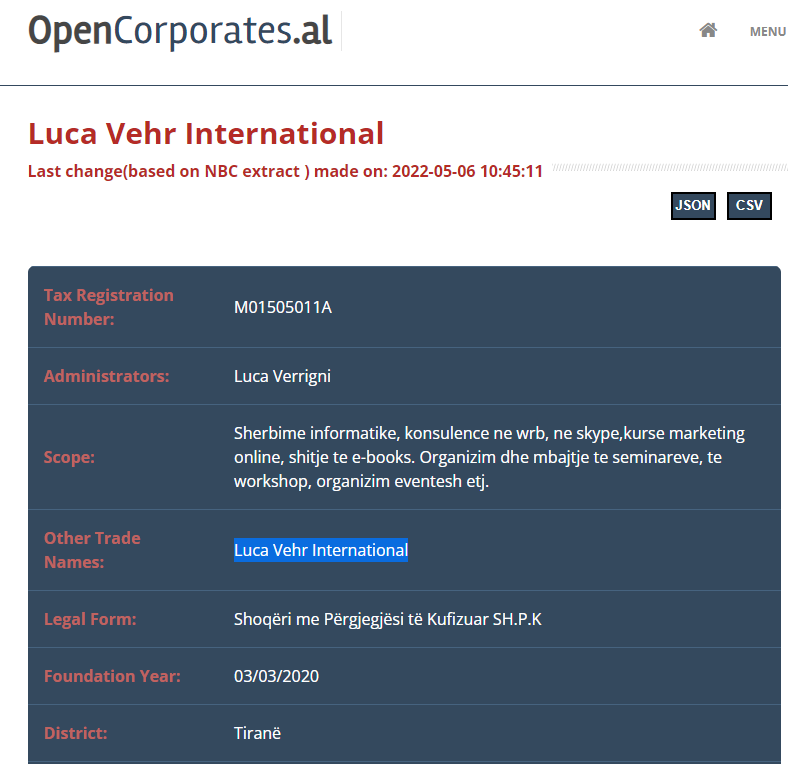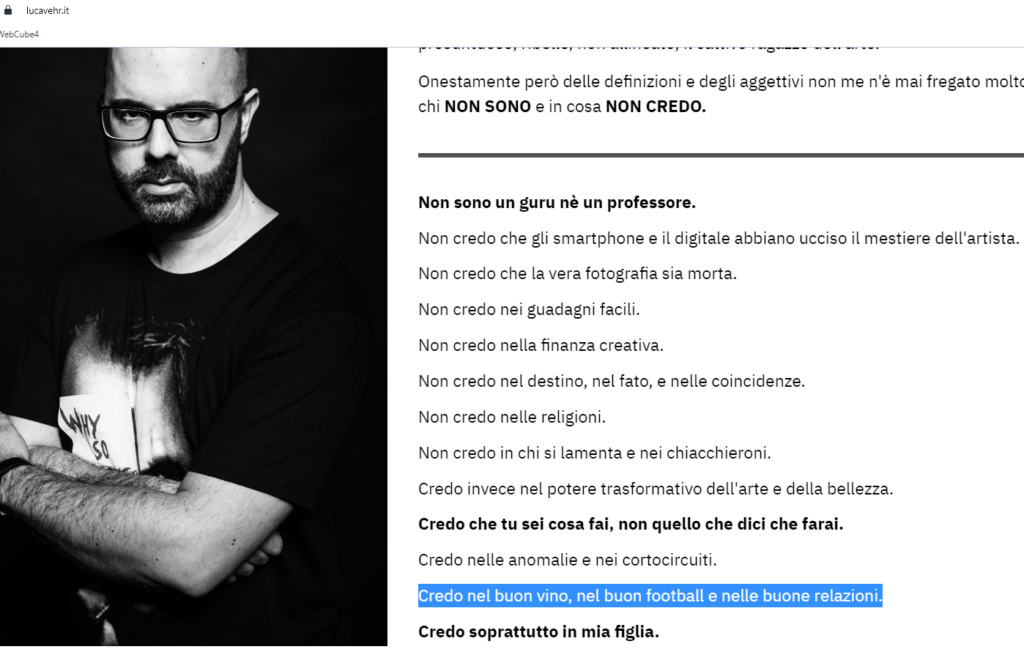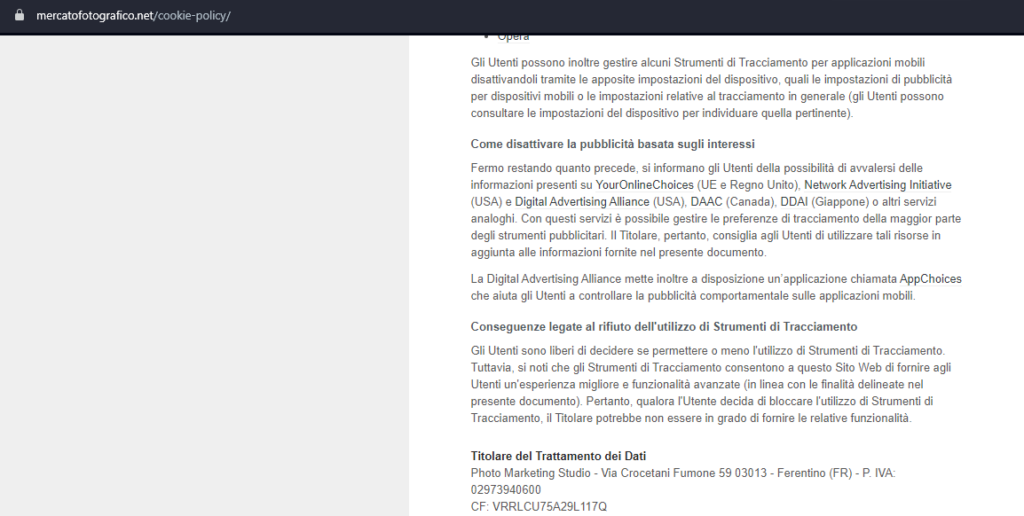In recent years, the digital landscape has witnessed a surge in self-proclaimed experts offering courses and webinars on various subjects, particularly in digital marketing and emerging technologies like NFTs (Non-Fungible Tokens). The accessibility of online platforms and the demand for expertise in these rapidly evolving fields have paved the way for individuals to establish themselves as authorities. One such figure is Luca Vehr, who presents himself as an international authority in marketing, sales, and communication for professional photographers and artists. However, a closer examination of his credentials and business practices reveals several inconsistencies and raises questions about his authenticity and ethics.

Background and Claims
According to his official website, Luca Vehr is recognized as one of the leading international experts in marketing for artists, boasting nearly two decades of collaboration with publishers, agencies, companies, and private clients both in Italy and abroad. He positions himself as a pioneer in NFTs and crypto art, claiming expertise in these emerging fields and presenting his insights as indispensable to artists seeking success in the digital age.
Vehr’s marketing emphasizes his ability to help professional photographers and artists achieve commercial success. His promotional materials frequently highlight his supposed global reach and his collaboration with high-profile clients, suggesting a deep understanding of the artistic and technological domains. Additionally, he claims to have developed innovative strategies that blend traditional marketing with cutting-edge digital tools, creating unique opportunities for his clients.
Inconsistencies in Professional Experience
Despite these impressive claims, there are notable discrepancies in Vehr’s stated experience that warrant scrutiny. These inconsistencies cast doubt on the authenticity of his credentials and undermine his claims of expertise:
- Duration of Experience: While he asserts having nearly 20 years of experience in digital marketing, the timeline raises significant doubts. The digital marketing landscape, particularly concerning social media platforms, has evolved substantially over the past decade. Similarly, NFTs, which form a significant part of Vehr’s purported expertise, have gained prominence only within the last few years. These factors make it improbable for anyone to have extensive experience in the NFT domain as Vehr claims.
- Business Establishment: Investigations into the registration details of his business, “Luca Vehr International,” reveal that it was established on March 3, 2020, in Tirana, Albania. This relatively recent establishment contradicts his claims of long-standing international operations and raises questions about the legitimacy of his alleged global reputation.
- Ambiguous Client Collaborations: While Vehr frequently mentions his collaborations with publishers, agencies, and private clients, there is a lack of verifiable evidence to support these assertions. Searches for testimonials or case studies that substantiate his claims yield little to no results, leaving potential clients with unanswered questions about his actual impact.

Questionable Marketing Practices
Vehr’s promotional strategies have also come under scrutiny for their aggressive and, at times, opaque nature. These practices not only raise concerns about the value of his offerings but also highlight potential ethical issues:
- Aggressive Sales Tactics: Vehr markets high-priced courses related to NFTs, digital marketing, and online branding. His sales techniques often involve high-pressure tactics, emphasizing the urgency and exclusivity of his programs. While these strategies are not uncommon in digital sales, they have drawn criticism for creating a false sense of scarcity and urgency, leading clients to question the actual value of the content provided.
- Unverified Credentials: Despite portraying himself as a leading expert in his field, there is a conspicuous lack of verifiable information supporting his qualifications or professional background. His online presence relies heavily on self-promotion and testimonials that appear curated, further obscuring his true level of expertise.
- Overpromising Results: Vehr’s promotional content often makes bold claims about the transformative potential of his courses, suggesting that participants can achieve significant financial success or recognition in their respective fields. However, critics argue that these promises are often unsubstantiated and misleading.
Attempts to Suppress Criticism
Critics allege that Vehr has engaged in concerted efforts to suppress negative feedback and articles that question his credibility. These actions suggest a pattern of behavior aimed at controlling his public image at the expense of transparency and accountability:
- Legal Threats and Financial Incentives: Reports suggest that Vehr or his associates have attempted to silence unfavorable content by issuing legal threats or offering financial incentives to have such material removed. For instance, a blog post by Alex Pilion, which raised concerns about Vehr’s authenticity, reportedly faced such suppression attempts. These tactics not only raise ethical concerns but also undermine the credibility of the individuals employing them.
- Manipulation of DMCA Takedown Notices: Investigations have uncovered instances where Vehr’s team may have employed fraudulent DMCA takedown notices to remove negative content from search results. This tactic involves creating backdated copies of original articles and falsely claiming copyright infringement to have the legitimate content removed. Such actions constitute a deliberate misuse of legal mechanisms and represent a direct attack on free speech.
- Online Reputation Management: Vehr appears to invest heavily in online reputation management, focusing on burying negative content through search engine optimization (SEO) tactics. While reputation management is a common practice, the extent to which Vehr’s efforts involve suppression of legitimate criticism raises serious ethical questions.

Ethical and Legal Implications
The strategies employed by Vehr to manage his online reputation and promote his business have significant ethical and legal ramifications:
- Ethical Concerns: Suppressing legitimate criticism and engaging in deceptive practices reflect poorly on business ethics. Such actions raise questions about the integrity of individuals who prioritize their public image over transparency and accountability. For potential clients, this lack of openness undermines trust and calls into question the true value of the services offered.
- Legal Violations: The misuse of DMCA takedown processes and the submission of fraudulent claims can lead to serious legal consequences, including charges related to forgery and perjury. Such actions are prosecutable offenses in many jurisdictions and could result in significant penalties if proven.
- Impact on Consumers: The ethical and legal issues surrounding Vehr’s practices have broader implications for consumers, particularly those seeking guidance in complex and emerging fields like NFTs. By presenting himself as an unchallenged authority, Vehr may mislead individuals into investing significant time and resources into courses that fail to deliver on their promises.

Broader Implications and Lessons Learned
The case of Luca Vehr highlights broader issues within the digital education landscape. As online learning platforms and self-proclaimed experts proliferate, the need for due diligence has never been greater. Consumers must approach online courses and mentorship programs with skepticism, prioritizing transparency and verifiable credentials over marketing hype.
- The Importance of Verifying Credentials: Before investing in any program or course, consumers should conduct thorough research to ensure that the instructor’s claims are substantiated by verifiable evidence. Independent reviews, testimonials, and a clear history of professional accomplishments can help establish credibility.
- Critical Thinking in the Digital Age: The digital age has democratized access to information, but it has also made it easier for misinformation and exaggerated claims to thrive. Consumers must cultivate critical thinking skills to navigate this complex landscape and avoid falling victim to deceptive practices.
- Advocating for Transparency: The responsibility for promoting transparency in digital education lies not only with consumers but also with regulators and platforms. Establishing clear standards for advertising, credential verification, and ethical marketing practices can help protect consumers from misleading claims.
Conclusion
While the digital age has democratized access to information and expertise, it has also enabled the proliferation of self-proclaimed experts whose credentials may not withstand scrutiny. The case of Luca Vehr serves as a cautionary tale for consumers to exercise due diligence when engaging with online courses and purported experts. It underscores the importance of verifying credentials, seeking transparency, and being wary of aggressive marketing tactics that may mask a lack of genuine expertise.
In an era where information is readily accessible, critical thinking and skepticism remain essential tools for navigating the complex landscape of digital education and mentorship. By demanding accountability and transparency from educators and platforms, consumers can foster a more ethical and trustworthy digital learning environment.







